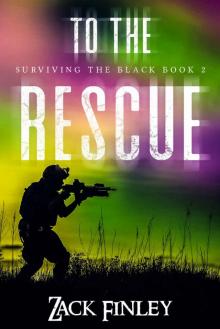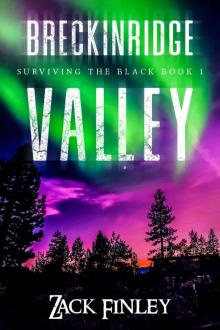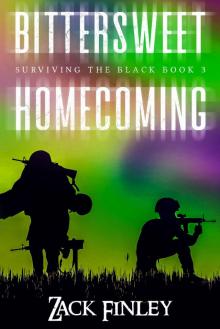- Home
- Zack Finley
Breckinridge Valley: Surviving the Black--Book 1 of a Post-Apocalyptical series
Breckinridge Valley: Surviving the Black--Book 1 of a Post-Apocalyptical series Read online
Breckinridge Valley
Book 1 of Surviving the Black
By Zack Finley
Table of Contents
Copyright 2019 by Zack Finley.
Chapter 1
Chapter 2
Chapter 3
Chapter 4
Chapter 5
Chapter 6
Chapter 7
Chapter 8
Chapter 9
Chapter 10
Chapter 11
Chapter 12
Chapter 13
Chapter 14
Chapter 15
Chapter 16
Chapter 17
Chapter 18
Author’s note:
Copyright 2019 by Zack Finley.
All rights reserved. This is a work of fiction. Names, characters, places, and incidents either are the products of the author’s imagination or if real are used fictitiously. Any resemblance to actual persons, living or dead, is entirely coincidental. While some actual geographic locations are described within, substantial liberties were taken when describing them and their surroundings to advance this story.
Chapter 1
It was still an early spring morning. The sun hadn’t cleared the horizon, but I couldn’t sleep. My bed was too big. Too empty. Another mostly sleepless night of repercussions and guilt.
I got out of bed slowly, to avoid disturbing Melissa. She was sound asleep tucked in a ball at the foot of the bed like she was most mornings. At first, I tried to talk with her about it. When I did, she refused to leave her room for several nights and woke us all with gut-wrenching screams. She was only 9 years old. Too young to lose her mom.
If sleeping in her mom’s bed helped her sleep through the night, I wasn’t going to object. I spoke with the Army psychiatrist about what I should do, and he said to let her cope in her own way. I didn’t ask him how I was supposed to deal.
If I were here, maybe Irene would have lived. The doctors told me there was nothing that could have saved her, but what do they really know? I’d have gladly given my life for hers.
But I had to soldier on, for Melissa and for Jennifer.
Jennifer was 12 years old, going on 50. She blamed me. Her way of coping was to ignore me. When I said something, she looked straight through me.
Last night Jennifer stayed with my folks. They’d been with her since an aneurysm struck Irene down. The psychiatrist told me Jennifer didn’t really hate me. She blamed herself for her mother’s death and was just transferring the guilt to me.
The Army was great, the moment I got the word, they had me on a chopper leaving the secret location where I was deployed in no time. I hopped on a transport returning to the states, rented a car and drove like hell to Tennessee. By then I knew there was no need to go to the hospital.
Everyone was gathered at my parents’ compound by the time I got there. My parents loved my girls, but I couldn’t handle the guilt. My girls blamed me for not saving their mom. For not being home with them. For not being there.
I dealt with violent death too many times before. Survivor’s guilt and harsh lessons of combat when someone closer than a brother is erased in an explosion of blood and tissue. Part of the reason I fought in wars far from home was to spare my family and my girls. In the beginning, I believed I was fighting abroad to keep the terrorists away from home. I was more jaded now. Now I fought for my team, for my brothers.
I should have turned away from the seduction of combat once I realized it was no longer about keeping our country safe. I signed up to fight, and a Breckenridge never backed down.
I received my Army discharge papers yesterday. I knew my commander pulled a lot of strings to make this happen so quickly. But I hadn’t told my family. If I told them I’d have to begin making plans. I’d have to restart my life. I hadn’t even told them I requested a discharge with only five more years to qualify for a military pension. Everyone assumed I’d stick it out and then retire. That was the plan. Until Irene died.
My girls needed me, and I knew deep in my soul that I needed them. Five years in a child’s life is forever. I already regretted spending much of the past 15 years away from my family. After Melissa was born, Irene moved into a house near my folks. It seemed the best option for us. The time between deployments was getting shorter and shorter.
The longest time together was the six months of rehab after shrapnel messed me up. It was nearly a Hollywood injury, and I got to be with my girls for much of the rehab. My arm and leg healed well.
I still tried to shield my girls from the twisted scars, but my wounds were part of who I was. I was more careful to keep the emotional scars hidden deep inside me. Irene knew about those wounds, and there were times only her steadfast love kept them from consuming me.
Now, I was free from the Army, and my girls were strangers. I had nowhere to be, but Melissa needed to catch the school bus in about an hour.
I pulled on pants and a shirt and went to make breakfast.
Toaster waffles with strawberry jam were today’s feast. I just drank coffee and made sure Melissa drank her milk. The breakfast seemed light on nutrients, but I saw no reason to fight it. I knew Irene froze the whole wheat waffles and canned the jam. The milk came from my dad’s dairy.
I walked with Melissa to the end of the valley to the school bus stop. Jennifer and a batch of her cousins were already there chatting away. Until we walked up, then the chatter stopped.
Jennifer greeted Melissa but didn’t say a word to me, not that I expected her to. I felt guilty that I didn’t even know the cousin’s names. You could tell they were Breckinridges, I just didn’t know how we were related.
Melissa and Jennifer were both obviously Breckinridges. Jennifer had the reddish hair typical of Breckinridge kids, bluish-grey eyes and a stubborn Breckinridge chin. Melissa had her mom’s blonde hair and sapphire blue eyes. Both had their mom’s slender build, and it was too early to tell how tall they’d be.
An African American boy and girl came up to the bus stop. They were probably not part of the Breckenridge clan, but they clearly belonged and were well liked.
Several other kids joined us over the next few minutes and they, too, lacked the classic Breckinridge features. I wondered which of our allies they were related to.
I knew the kids didn’t need me to stay until they caught the bus, but I was reluctant to leave until they did. I had avoided my mom and dad as long as I could. This was the first day since Irene’s death that Jennifer and Melissa were heading back to school.
This would be the first time I could talk with my folks without youngsters underfoot. Part of me wanted to leave on the bus with the youngsters.
I trotted back to the main compound, tapping on the front door as I entered. As usual, my mom was working hard doing something on the computer. She looked up and immediately closed down her program. She toggled a radio on her desk and told my dad to come up to the house. Clearly, she thought there was something we needed to discuss.
That didn’t stop her from wrapping her arms around me and hugging so tightly I struggled to breathe. I’m sure that was what caused my eyes to water.
“Pour yourself a mug of coffee and pull up a chair at the table,” she said, expecting me to follow her into the kitchen. My mom, Claire Breckenridge, was a strong woman. She was about 5’6” tall and probably weighed about 150. Most of that was bone and muscle. She didn’t work out or go to the gym. She was a farm wife. She tossed hay bales into the back of the pickup one day and canned vegetables the next. Her garden won her blue ribbo
ns at each year’s county fair, and her pies were unbelievable. She was also a programming and electronics wiz.
My dad, Aaron Breckenridge, was no gentleman farmer. I didn’t know how much of this valley he now owned, but all of us lived here because he wanted us to. He and mom made a lot of savvy investments. I knew he only farmed because he wanted to do.
My grandpa, Gerald Breckenridge, died about 10 years ago. He was a farmer and one of the top bootleggers in this part of the country. I suspected he gave a lot of his bootleg income to my dad to invest. When he died, he gave me a house in the valley. The house was mine as long as I let my dad design and build it. Grandpa Breckenridge was a survivalist when we just thought that meant farmer. He farmed before electricity came to Breckenridge valley. That wasn’t the official name of the valley, it was just what everyone called it.
Grandpa always expected electricity, cars, radio, and then television to disappear at some point. He took advantage of its benefits but made sure we had backup. When the family no longer farmed enough to feed everyone, he made sure we put away enough for an extended emergency. My grandma did most of her sewing on an electric machine, but she kept her foot-powered one, just in case.
That was how they raised my dad and uncles. Uncle Bob and Aunt Clarice now lived in grandpa’s homestead with my grandma. Bob was my dad’s oldest brother. He moved away from the valley before I was born and returned to retire here after I joined the army. I couldn’t have picked Bob or Clarice out of a lineup. I knew grandpa deeded homes in the valley to at least two of their kids when he died.
My dad’s youngest brother George was a taciturn man who never married. He lived in a small building on my grandpa’s property. Uncle George worked hard as a farmer. I enjoyed working with him. His patience with clumsy youngsters was unsurpassed. George had one quirk, he never invited people into his home. The tarpaper he tacked over the windows made sure even us boys never got a look inside. He liked his moonshine and played a mean fiddle. He was respectful to the ladies but swore like a drunken sailor whenever they weren’t around. I learned most of my cussing from him. It only took a few indiscrete cuss words for me to learn the wisdom of Uncle George, keep your cussing to yourself when the ladies were within earshot.
My mom was born only a few miles from the valley. Her family objected to her marrying a bootlegger’s son. Forgiveness is hard to find in the hill country of Tennessee. I know she never spoke with any of her family from the day she left her childhood home to marry my dad.
I went to grade school with several cousins on her side of the family, but they refused to speak to me. The school principal understood the hill country and whenever possible kept us in different classrooms. High school was a lot bigger and by then I seldom even noticed they were around.
My mom and dad carried on my grandpa’s survival efforts. They didn’t buy into most of the conspiracy theories that swirl around the internet. I knew my folks could have moved into a penthouse in New York City and traveled the world with their investments. Instead, they bought up most of our surrounding county and kept upgrading their preparations. They view preppers with a lot of reservations.
All of us kids learned to keep our mouths shut at an early age. I didn’t know what we were preparing for, but I knew it was a big secret. Each spouse learned the details only after the marriage. Irene and I promised to raise our kids to keep the secret when we accepted a home in the valley.
No one lived in our valley who wasn’t in on the family secret. Not everyone who lived here was a Breckenridge. My dad’s best friend Roger and his family lived in the valley with us. Roger’s oldest son, Jules, was my best friend growing up. Jules and I both left the valley to attend the same college. Jules studied astrophysics. I studied civil engineering. We drifted apart, and we hadn’t talked in years.
In college, I was torn between wanting to build things and making a difference in the war on terror. My grandpa fought in the Korean War, and my dad fought in Vietnam. Military service during wartime was a strong family tradition. ROTC was a way for me to serve my country while attending college. Between my classroom commitments, ROTC, and Irene, there was little time for anything else.
Jules and I didn’t keep in touch. I wanted to build and maybe blow up shit while he wanted to know how the sun really worked.
At the end of college, I married Irene and joined the Army. Jules left for graduate studies at Stanford.
Jules parents Roger and Carmine still lived in Breckenridge valley, along with their daughter Audrey and her husband, Jim. Roger’s oldest son, Andy, left the valley while Jules and I were in college.
I was absent too much to keep track of the new people my dad invited to live in the valley. I spotted a young Mennonite family, in a new homestead. I suspected they were farming some of my grandpa’s fields using the old methods. Mennonites are a very self-reliant people. I wasn’t surprised dad brought them to the valley.
We still kept plenty of cattle and horses, but I didn’t know who was caring for them.
I was startled out of my musings by my dad, removing his boots and coming into the kitchen. I looked apologetically at my mom, I hadn’t meant to daydream.
She patted my hand, “At least your thoughts were lighter than they have been. I’m just glad you are with us.”
“Son,” my dad started, sitting in his chair at the kitchen table and cradling his coffee in his hands. “Your girls need you. Heck, your mom and I need you. I know you were set on retiring from the Army, but your family needs you, now.”
“I know,” I sighed, sipping my lukewarm coffee. “My girls need a father. Melissa is still too frightened to sleep alone. Jennifer treats me like I’m worse than a stranger.”
“Give them time, honey,” my mom said, patting me once again on my hand. “The girls love you, but we are all hurting. And you are in so much pain it is hard for you to see that. They need to know you will be there. Right now, they are worried you will leave them.”
“My discharge papers came today,” I said, shocking them both. “The general hand-carried them through the red tape brigade. He tried to talk me into taking a training command instead, but he knows I’ve given enough to this country. I felt bad leaving my guys in the lurch, but they are all good commanders.”
“Oh honey, you did the right thing,” my mom said, rushing to crush me in her arms. “I was so worried for you and your girls. I thought you’d put that Breckenridge stubborn on and make the wrong choice.” Being hugged by my mom could be dangerous, I did say she could still lift and toss hay bales. I wiggled enough to breathe. She kissed me on the cheek and slipped back into her chair.
“That is great news, son,” my dad said. “Cause, I really need your help. We need to update The Plan.”
All my life I heard of The Plan. My participation in The Plan was pretty limited since leaving for college. When we accepted a home in Breckenridge valley, I knew the house would be built according to The Plan. We paid a monthly tithe to the association, as part of our contribution to The Plan. The tithe was cheaper than rent, but my dad believed you only valued something you paid for.
Everyone was assigned tasks and duties. For nearly 20 years my contributions were limited to either summer vacation from college or the four weeks leave I got off each year from the Army. Irene and the girls helped run the farm doing something to help the collective each day.
Last year I cut oak trees, then split and stacked firewood. Several years ago, I spent an entire fall planting blackberry brambles. I doubted blackberry cobbler or wildlife habitat were the only reasons for those plants.
From time to time I reviewed proposed designs from a civil engineering point of view. Some installations were in Breckenridge valley, and some weren’t. Operational security meant I didn’t ask. Did I really need to know why my dad wanted to buy a Bailey Bridge?
I sensed my role in The Plan was about to change. My dad just turned 68 this year. He and my mom were still vibrant and healthy, so I didn’t expect he was turning over t
he reins, but I’d coasted on the family’s coattails long enough.
“We need a generational update. Threats change, resources change, and people get old. When Pops died, it was a major challenge. It took me nearly 10 years to work through those problems and get The Plan where it needed to be. Pops knew the old-fashioned ways like the back of his hand. Unfortunately, we didn’t ensure that knowledge will still be there when we need it. That is partly why we welcomed Jacob and Rachel Neufeld to the valley. Ma and Jennifer are in the last stages of a how-to manual for us. She remembers a lot, but Jacob and Rachel have provided some very practical information. Jennifer and Ma have been doing a lot of research on the internet, together,” dad said.
“Most of our security force is my age or older,” dad said. “Our tactics are still to blow the bridge and shoot anyone who tries to rob us. We need a younger security force and an upgraded arsenal. We have a few M-16s, hunting rifles, and a few special weapons. I’m worried the crooks can now outshoot us. I want you to be the security force commander and my executive officer. I haven’t done much better than Pops in training my successor. I’m hoping that will stop, today.”

 To the Rescue; Surviving the Black--Book 2 of a Post-Apocalyptical Series
To the Rescue; Surviving the Black--Book 2 of a Post-Apocalyptical Series Dire Prophecy
Dire Prophecy Duchy Unleashed
Duchy Unleashed Mad Toffad's Keep
Mad Toffad's Keep Breckinridge Valley: Surviving the Black--Book 1 of a Post-Apocalyptical series
Breckinridge Valley: Surviving the Black--Book 1 of a Post-Apocalyptical series Bittersweet Homecoming; Surviving the Black--Book 3 of a Post-Apocalyptical Series
Bittersweet Homecoming; Surviving the Black--Book 3 of a Post-Apocalyptical Series